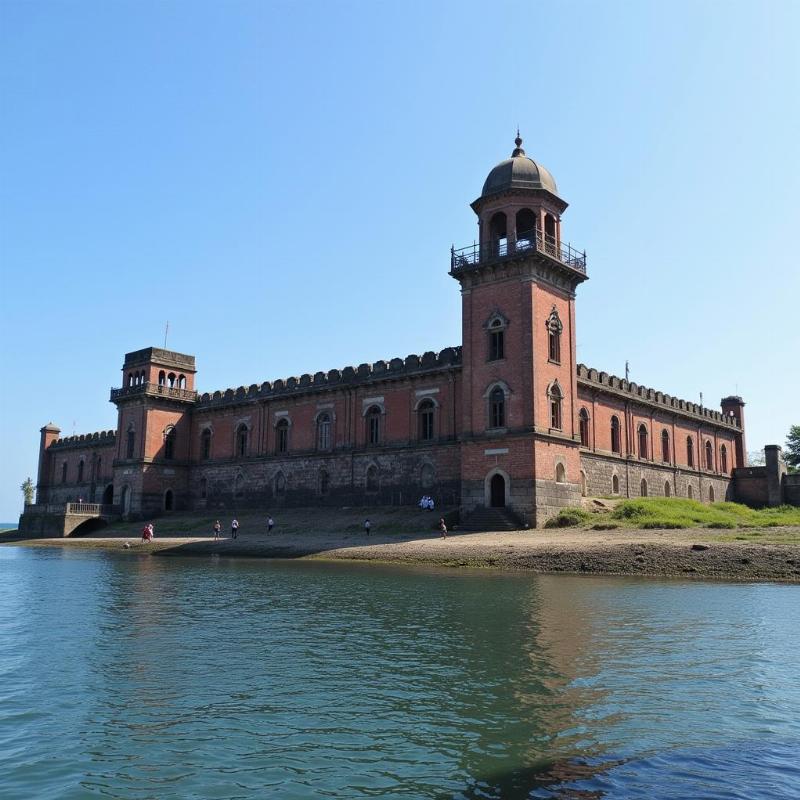India’s fight for independence is a saga of courage, sacrifice, and unwavering resolve. This struggle wasn’t confined to a single city or region; it echoed throughout the nation, leaving behind a legacy etched in stone and spirit. Exploring these places related to freedom struggle offers a powerful connection to India’s past and a deeper understanding of the sacrifices made for the nation’s freedom. These historic sites stand as poignant reminders of the trials and triumphs that shaped modern India.
Iconic Landmarks of India’s Freedom Struggle
India’s struggle for independence is etched into numerous landmarks across the country. These sites offer a glimpse into the lives of those who fought for freedom and the events that shaped the nation. Visiting these places is not just a historical journey, but a deeply personal and emotional one. Let’s delve into some of the most significant landmarks:
The Cellular Jail: A Symbol of Resistance
The Cellular Jail, located in the Andaman and Nicobar Islands, stands as a grim testament to the brutal conditions faced by freedom fighters. Its walls echo with tales of resilience and sacrifice, narrating the stories of countless individuals imprisoned for their unwavering commitment to India’s independence.
 Cellular Jail Andaman Islands
Cellular Jail Andaman Islands
Jallianwala Bagh: A Scar on the Nation’s Memory
Jalianwala Bagh in Amritsar, Punjab, is a somber reminder of a dark chapter in India’s freedom struggle. The site of a horrific massacre, it serves as a memorial to the hundreds of innocent lives lost. A visit to Jallianwala Bagh evokes powerful emotions, reminding us of the price paid for freedom.
Sabarmati Ashram: The Cradle of Non-violent Resistance
Mahatma Gandhi’s Sabarmati Ashram in Ahmedabad, Gujarat, was the epicenter of India’s non-violent resistance movement. This simple yet powerful location was the launchpad for many significant movements, including the Dandi March. Walking through the ashram offers a glimpse into Gandhi’s life and philosophy.
“The Sabarmati Ashram is more than just a historical site; it’s a sanctuary of peace and a testament to the power of non-violence,” says Dr. Anjali Sharma, a renowned historian specializing in India’s freedom movement.
Exploring Lesser-Known Sites of Significance
Beyond the well-known landmarks, numerous lesser-known sites played crucial roles in the freedom struggle. These hidden gems offer unique insights into the diverse tapestry of India’s fight for independence. paragraph on places related to freedom struggle often focus on these locations, providing valuable information for travelers interested in exploring the rich history of India.
The Aga Khan Palace: A Place of Confinement and Resilience
The Aga Khan Palace in Pune, where Mahatma Gandhi and Kasturba Gandhi were interned, is one such site. This majestic palace witnessed a significant period of India’s freedom movement and holds a special place in the nation’s history.
Fort St. George: A Witness to Early Resistance
Fort St. George in Chennai, a significant landmark from the British colonial era, also played a role in the freedom movement. While originally a center of British power, it later became a focal point for Indian resistance. places to visit in jhansi and other historical cities offer similar insights into the complex interplay between colonial rule and the burgeoning freedom movement.
“Exploring these lesser-known sites can provide a more nuanced understanding of the freedom struggle,” adds Dr. Sharma. “They offer a glimpse into the localized struggles and the diverse contributions of people from different regions.”
Conclusion
Visiting places related to freedom struggle is a journey through India’s past, a poignant reminder of the sacrifices made for the nation’s independence. From iconic landmarks to lesser-known sites, each location offers a unique perspective on the events and individuals that shaped India’s destiny. These historical sites serve as a powerful testament to the spirit of freedom and offer invaluable lessons for future generations. Exploring these places allows us to connect with our history on a deeper level and appreciate the hard-won freedom we enjoy today.
FAQ
- What is the significance of the Cellular Jail? The Cellular Jail was a colonial prison used to exile political prisoners during the freedom struggle. It stands as a symbol of the harsh conditions faced by those who fought for India’s independence.
- Why is Jallianwala Bagh considered a significant site? Jallianwala Bagh is the site of a tragic massacre during the freedom struggle, serving as a memorial to the innocent lives lost.
- What is the historical importance of the Sabarmati Ashram? The Sabarmati Ashram was Mahatma Gandhi’s residence and the center of his non-violent resistance movement.
- Are there any lesser-known sites related to the freedom struggle? Yes, numerous lesser-known sites, such as the Aga Khan Palace and Fort St. George, offer unique insights into the freedom movement.
- Why is it important to visit these historical sites? Visiting these sites allows us to connect with our history, understand the sacrifices made for freedom, and appreciate the significance of India’s independence.
Related Articles
Check out our other articles related to travel and history in India: places to see in jhansi and best places to chill in delhi
About PlaTovi
PlaTovi is your trusted travel partner for exploring the incredible destinations of India and beyond. We offer comprehensive travel solutions, from curated tour packages to hotel bookings, flight reservations, and event planning. Whether you’re seeking a traditional tour with sightseeing, dining, and shopping, or a relaxing getaway at a luxury resort, PlaTovi has you covered. We also specialize in international and domestic flight bookings, event and wedding planning, car rentals, airport transfers, and visa assistance. Contact us for an unforgettable travel experience tailored to your needs. Email: [email protected], Phone: +91 22-2517-3581.